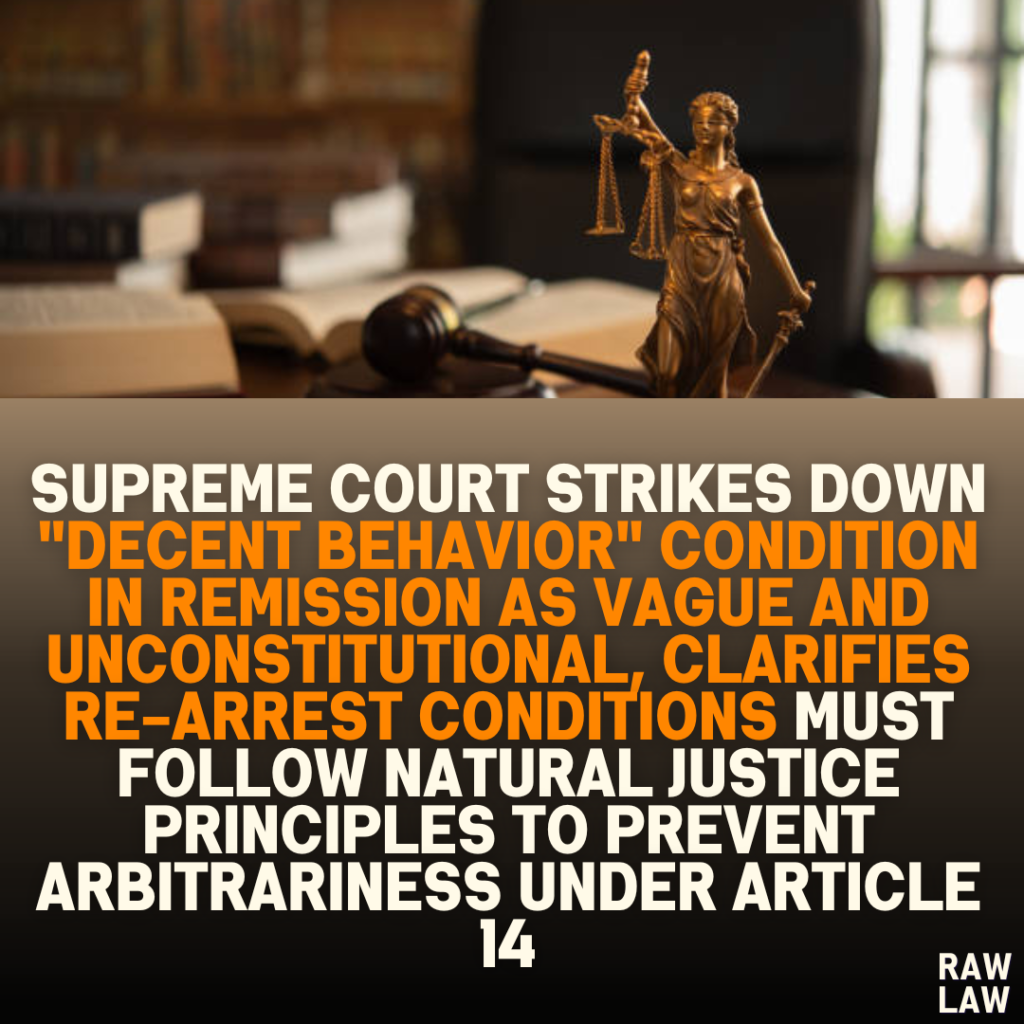Court’s Decision:
The Supreme Court partly allowed the appeal, striking down the first part of condition no. 1 imposed during the remission of the appellant’s life sentence, as it was found to be manifestly arbitrary and in violation of Article 14. The Court clarified condition no. 2, stating that any breach of conditions must be dealt with following the principles of natural justice. The remission granted would not be revoked without such compliance.
Facts:
The appellant was convicted under Section 302 read with Sections 147 and 148 of the Indian Penal Code in 2008 and sentenced to life imprisonment. Upon applying for remission under Section 432 of the Code of Criminal Procedure, 1973 (CrPC), the Government of Gujarat granted remission on September 15, 2023, subject to four conditions. The appellant challenged the first two conditions in the Supreme Court, which related to maintaining “decent behavior” for two years and facing automatic arrest upon committing any cognizable offense after release.
Issues:
- Whether the conditions imposed during the remission, specifically conditions nos. 1 and 2, violated the appellant’s constitutional rights.
- Whether the conditions were arbitrary and lacked clarity, rendering them unconstitutional under Article 14.
Petitioner’s Arguments:
The petitioner contended that the first condition, requiring “decent” behavior, was vague and lacked legal clarity, as the concept of decency differs from person to person. This vagueness, according to the appellant, violated Article 14 of the Constitution by conferring excessive discretion on the government. Additionally, the second condition, which could lead to the appellant’s immediate re-arrest for any alleged cognizable offense, was seen as unjust, as even a false allegation could result in the appellant losing his remission.
Respondent’s Arguments:
The State of Gujarat, through its counsel, argued that under Section 432(1) of the CrPC, the appropriate government has the discretionary power to impose conditions when granting remission. It was submitted that remission is not a convict’s right but a matter of discretion for the government, as recognized in past judgments. The conditions were argued to be necessary for public interest and to ensure the peaceful reintegration of the convict into society.
Analysis of the Law:
The Court analyzed Section 432 of the CrPC, which allows the government to remit sentences subject to conditions accepted by the convict. The Court acknowledged that while remission is a discretionary power, conditions imposed must be reasonable and cannot be arbitrary or violative of constitutional rights. The Court found that vague conditions such as the requirement of “decent behavior” lacked clear definition and could lead to arbitrary decisions by the executive, violating Article 14 of the Constitution.
Precedent Analysis:
The Court referred to several past decisions, including Shaikh Abdul Azees v. State of Karnataka and V. Sriharan alias Murugan v. Union of India, which emphasize that remission must be reasonable, and conditions imposed should not be arbitrary. It further reinforced that the government’s decision to revoke remission must be based on fair procedures and compliance with the principles of natural justice.
Court’s Reasoning:
The Court reasoned that the term “decent behavior” was too vague to be enforced consistently, leading to potential arbitrary revocation of remission. Such a condition grants the government excessive discretion and violates Article 14. Furthermore, condition no. 2, regarding re-arrest upon committing any cognizable offense, was clarified. The Court held that mere registration of an offense does not justify automatic cancellation of remission. Instead, the convict must be given a fair opportunity to contest the breach of conditions under the principles of natural justice.
Conclusion:
The Court struck down the first part of condition no. 1 as unconstitutional and clarified that condition no. 2 must be applied in accordance with the principles of natural justice. The appeal was partly allowed, and the appellant’s surety bonds were canceled to the extent of condition no. 1. The order of remission could not be revoked without proper procedure.
Implications:
This judgment underscores the need for clear, reasonable, and fair conditions when remission is granted. It prevents arbitrary imposition of vague conditions that could lead to unfair cancellations of remission, ensuring that the convict’s constitutional rights are protected. The decision reinforces the principles of natural justice in the context of sentence remission, impacting future cases where similar conditions may be imposed.




Pingback: Bombay High Court Upholds Appellate Bench's Reversal of Eviction Decree: Invalid Demand Notices Under Section 15(2) of MRC Act and Unsubstantiated Bona Fide Requirement Claims - Raw Law